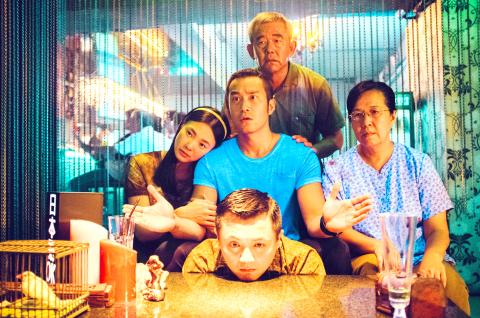An assassin haunted by the ghosts of his victims is the tantalizing conceit of The Laundryman (青田街一號), the feature debut by up-and-coming director Lee Chung (李中). There is a bit of everything in this black comedy — from a healthy dose of romance and suspense to abundant action. To top it all off, this boisterous genre concoction is made with sleek production values and an A-list cast.
The Laundryman sets out to win the audience’s heart. While the plot is sometimes uneven, Lee keeps his focus without overstretching the viewer’s credulity, offering a clever exploration on the perennial dichotomy of good and evil.
Joseph Chang (張孝全) plays the laundryman, a hitman who takes orders from A-gu, a femme fatale played by model-turned-actress Sonia Sui (隋棠). By day, A-gu runs a dry-cleaning store. At night, the laundryman brings his completed assignment back to the shop, processes it and washes it out.

Photo courtesy of Activator Marketing Company
Life for the laundryman revolves around killing and removing bodies. Things follow an orderly routine except for the fact that every day when the man returns home, a group of ghosts wait for him in his claustrophobic apartment. Scared and baffled, he seeks help from Lin Hsiang (Wan Qian, 萬茜), a spirit medium who can communicate with ghosts.
As you can image, the ghosts are the laundryman’s victims, and now they want to know who wanted them dead and why. As the assassin and the medium try to search out the clients, dark secrets emerge, leading to a past that involves A-gu, her psychiatric experiments and her subjects.
The Laundryman works with a number of clever ideas. At the center of the film is the laundry shop, where all the blemishes, filth and troubles in life can be washed away. It tackles the subject of morality, as the assassin learns that he has the freedom to make what he believes to be the right choices.

Photo courtesy of Activator Marketing Company
Yao Hung-i’s (姚宏易) cinematography further imbues the tale with expressive exuberance. The space inhabited by the characters is fantastic, kaleidoscopic and yet tinged with a sense of closeness that offers no escape.
But the film is never intended to reach the level of poignancy. Chen Yu-hsun (陳玉勳),who co-wrote the script with Lee Chung, sprinkles the story with his signature sense of humor.
Also with Chen’s input, it comes as no surprise that the film is lively with vividly idiosyncratic characters. Joseph Chang invests in his role a peculiar mixture of vacant calmness and savage innocence, which recalls his performance in Chung Mong-hong’s (鍾孟宏) Soul (失魂) as a man who loses his soul.
Performances by the female leads are equally appealing. Chinese actress Wan shows off a sassy side with a measured dose of playfulness. Meanwhile, Sui does a good job as the embodiment of evil, tempting people to act on their malicious impulses and hateful thoughts.
Supporting actors are mostly strong, including Michael Chang (張少懷), Kao Meng-chieh (高盟傑) and Peggy Tseng (曾珮瑜). In particular, the cameo appearance of producer Lee Lieh (李烈), who co-produces the film, as a beheaded ghost, recalls director Chen’s 2011 short Hippocamp Hair Salon (海馬洗頭), a mystery/black comedy starring Lee Lie and director Ko I-chen (柯一正).
Those curious about the Chinese title of the film, which translates as 1, Qingtian Street (青田街一號), will find the answer in the movie’s climax.

The unexpected collapse of the recall campaigns is being viewed through many lenses, most of them skewed and self-absorbed. The international media unsurprisingly focuses on what they perceive as the message that Taiwanese voters were sending in the failure of the mass recall, especially to China, the US and to friendly Western nations. This made some sense prior to early last month. One of the main arguments used by recall campaigners for recalling Chinese Nationalist Party (KMT) lawmakers was that they were too pro-China, and by extension not to be trusted with defending the nation. Also by extension, that argument could be

Aug. 4 to Aug. 10 When Coca-Cola finally pushed its way into Taiwan’s market in 1968, it allegedly vowed to wipe out its major domestic rival Hey Song within five years. But Hey Song, which began as a manual operation in a family cow shed in 1925, had proven its resilience, surviving numerous setbacks — including the loss of autonomy and nearly all its assets due to the Japanese colonial government’s wartime economic policy. By the 1960s, Hey Song had risen to the top of Taiwan’s beverage industry. This success was driven not only by president Chang Wen-chi’s

Last week, on the heels of the recall election that turned out so badly for Taiwan, came the news that US President Donald Trump had blocked the transit of President William Lai (賴清德) through the US on his way to Latin America. A few days later the international media reported that in June a scheduled visit by Minister of National Defense Wellington Koo (顧立雄) for high level meetings was canceled by the US after China’s President Xi Jinping (習近平) asked Trump to curb US engagement with Taiwan during a June phone call. The cancellation of Lai’s transit was a gaudy

The centuries-old fiery Chinese spirit baijiu (白酒), long associated with business dinners, is being reshaped to appeal to younger generations as its makers adapt to changing times. Mostly distilled from sorghum, the clear but pungent liquor contains as much as 60 percent alcohol. It’s the usual choice for toasts of gan bei (乾杯), the Chinese expression for bottoms up, and raucous drinking games. “If you like to drink spirits and you’ve never had baijiu, it’s kind of like eating noodles but you’ve never had spaghetti,” said Jim Boyce, a Canadian writer and wine expert who founded World Baijiu Day a decade